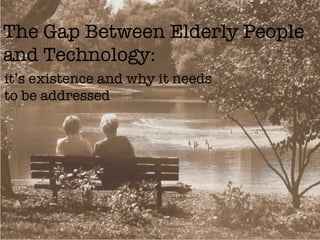The Gap Between Elderly People and Technology
- 1. The Gap Between Elderly People and Technology: it’s existence and why it needs to be addressed
- 2. Currently, access and usage of the Internet amongst seniors is limited. Smith, 2015
- 3. Two-thirds of the 74+ population do not own a computer and virtually none have a tablet computer or smart phone. In fact, only 30% of the 74+ population indicated that they even go online at all. Smith, 2015
- 4. In a 2014 study, older adults were more likely to value “necessities” as a landline telephone, television, or cable TV rather than a home computer or cell phone. Hudson, 2014
- 5. 77% of 18-24 year olds agree When nothing is occupying my attention, the first thing I do is reach for my phone. When nothing is occupying my attention, the first thing I do is reach for my phone. only 10% of 65+ year olds agree Digital behaviour in Canada per generation is vastly different. Krashinsky, 2015
- 6. As of 2014, only around half of seniors over 65 have used the Web. Matrix, 2017
- 7. Complex process for seniors to get equipment and/or the service needed to acquire it. The gap in online access among older seniors is not surprising. Few technology vendors focus on the older age cohorts. Smith, 2015
- 8. Notably, older adults aged 65 and over were found to be less likely to use the internet or a computer in the future due to lack of interest. In 2010, only 31% of older adults in America used high speed internet compared with 75% of adults aged 30-49 and 63% of adults aged 50-64. Kim, 2014
- 9. After interviewing people at seniors homes, older adults find technology confusing to use, too expensive to purchase, difficult to understand, and overall incompatible with their lifestyle. Matrix, 2017
- 10. “People are living to be older. I am 93 years old and able to do nothing. They aren’t thinking of real old people.” The Linkage Survey, 2011
- 11. “I love computer technology. I had that equipment prior to my stroke, I’ve tried many times but touch system is not working, as it affected fine motor parts.” The Linkage Survey, 2011
- 12. “Technology is important and serves many areas of daily living but is also very intimidating and intrusive depending on your view of it in regard to one’s personal preferences.” The Linkage Survey, 2011
- 13. 77% of older people would need someone to help walk them through the process of setting up a new device. Using touchscreens may come naturally enough to a toddler but not necessarily for an older person - the nerves in the finger become less sensitive with age, meaning older people may "touch" far more heavily. Wakefield, 2015
- 14. Why does this gap need to be addressed?
- 15. By 2050, two billion people will be over the age of 60. Hay, 2015
- 16. Longer lifespans can be attributed in part to the development of new technologies, but ironically new technologies are never focused on making day-to- day life easier for the elderly. Hay, 2015
- 17. Older adults’ willingness and ability to adapt to technology is influenced by the availability of technological support in their network of family and friends. Coughlin, 2014
- 18. Technology enables older adults and seniors to be more active and improve their quality of life. Kim, 2014
- 19. Seniors can more easily communicate with their children and grandkids through email, Facebook, Twitter, Skype, and other social media platforms. Kim, 2014
- 20. Bridging the Gap
- 21. Apple and IBM announced in a joint venture that they are designing iPad apps set to come out by 2020 that will be "very easy to use for seniors to use”. Aimed to start in the Japanese market, the apps will help connect millions of older people with healthcare services. Apple Inc., 2015
- 22. Access to high speed connectivity needs to be a fundamental right in Canada – it’s becoming a critical component of participatory cultural citizenship. This is incredibly important for seniors as they should have a certain amount of digital literacy. Matrix, 2017
- 23. Closing the technology gap between generations will improve seniors’ overall quality of live and is beneficial to all parties. Kim, 2014
- 24. Works Cited Apple Inc. (2015, April 30). Apple (Canada) -‐ Apple Press Info -‐ Japan Post Group, IBM and Apple Deliver iPads and Custom Apps to Connect Elderly in Japan to Services, Family and Community. Retrieved March 02, 2017, from hLps://www.apple.com/ca/pr/library/2015/04/30Japan-‐Post-‐Group-‐IBM-‐and-‐Apple-‐Deliver-‐iPads-‐and-‐ Custom-‐Apps-‐to-‐Connect-‐Elderly-‐in-‐Japan-‐to-‐Services-‐Family-‐and-‐Community.html Coughlin, J. F. (2014). Technology, innovaTon, and developing a NexGen aging services workforce. Public Policy & Aging Report 24, 6–9. doi: 10.1093/ppar/prt009 Hay, T. (2015, June 29). Technology InnovaTons That Could Help the Elderly. Retrieved February 27, 2017, from hLps://www.wsj.com/arTcles/technology-‐innovaTons-‐that-‐could-‐help-‐the-‐elderly-‐1435245122 Hudson, R. B. (2014). Aging and Technology: The Promise and the Paradox. Public Policy & Aging Report, 24(1), 3-‐5. doi:10.1093/ppar/prt010 Kim, K., Chodzko-‐Zajko, W., Schwingel, A., & McDonagh, D. C. (2014). Understanding older individuals’ emoTonal responses to new technology associated with healthy lifestyle choice . Journal of Physical Educa?on and Sport, 14(2). Retrieved March 01, 2017. Krashinsky, S. (2015, May 11). AdverTsers cash in on aLenTon spans of digitally savvy Canadians. Retrieved March 02, 2017, from hLp://www.theglobeandmail.com/report-‐on-‐business/industry-‐news/markeTng/microsod-‐ study-‐looks-‐at-‐aLenTon-‐span-‐of-‐digitally-‐savvy-‐canadians/arTcle24359527/ Matrix, S. (Director). (2017, January). Film 240 Lecture 1. Retrieved February 23, 2017. Smith, A. (2015, April 01). U.S. Smartphone Use in 2015. Retrieved March 01, 2017, from hLp:// www.pewinternet.org/2015/04/01/us-‐smartphone-‐use-‐in-‐2015/ The Linkage Survey. (2011, November). Technology Survey Age 65 to 100. Retrieved March 02, 2017, from hLps:// www.ageinplacetech.com/files/aip/Linkage%20Technology%20Survey%20Final_2.pdf Wakefield, J. (2015, May 25). The generaTon that tech forgot. Retrieved February 26, 2017, from hLp:// www.bbc.com/news/technology-‐32511489
- 25. Image Citations All images used are directly from Flickr, and have explicitly stated that they are available for reuse in this context.
